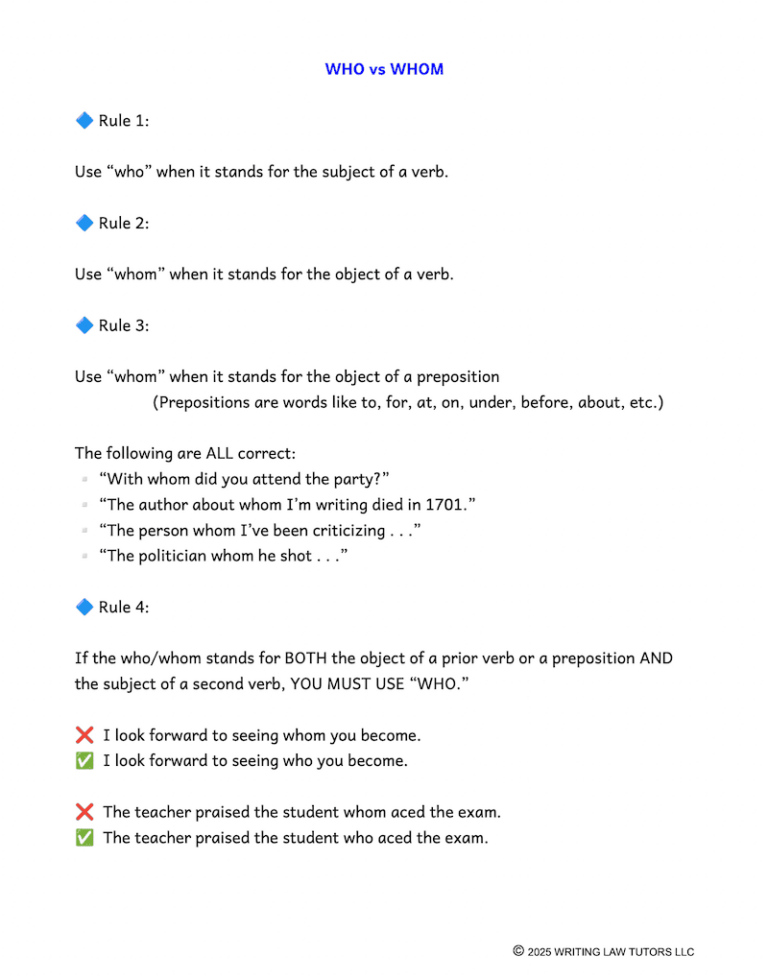“Who vs. Whom”
Dear Legal Writer,
I’ve got a MONSTER today: “who vs. whom”
Truth is: I’ve been scared to write about it before.
And please don’t say, “ just follow the easy ‘he/him’ rule.”
I know that “easy rule.”
The topic is more nuanced.
So here I go.
⬇️
First, here’s an illustration of the standard “he/him” rule:
▪️ Take the sentence, “_____ went to the store?”
We would say, “He went to the store.”
We wouldn’t say, “Him went to the store.”
Therefore, ✅ “who” is correct.
▪️ This one’s harder: “_____ did you see at the store?”
A: “Whom did you see at the store?”
B: “Who did you see at the store?”
Following the “he/him rule,” one would say, “I saw him at the store,” so the correct choice should be A.
But I’d write B every single day.
It is far more natural.
So which is correct?
As a grammar expert and the author of several books on the subject, Patricia O’Connor, explains,
“Therein lies the rub. . . The word ‘whom’ is rarely spoken anymore, and it sounds funny when used to start a question.”
Garner similarly counsels that in most contexts, “whom” is too stiff:
“Every sensible English speaker on both sides of the Atlantic says ‘Who were you talking to?’ [– not ‘Whom’ –] and the sooner we begin to write it the better.”
—Bryan A. Garner (quoting J.Y.T. Greig, Breaking Priscian’s Head 23 ([n.d. — ca. 1930])).
Boiled down, choice A is grammatically correct.
Choice B sounds more natural.
👉 You can use either one and will be fine.
⬇️
A second rule that some espouse is to use “whom” after a preposition, such as in,
“To whom it might concern,” and
“With whom did you go to the store?”
That rule (the “preposition rule”) works most of the time, but again, it’s simplistic.
In fact, what triggered this post was a comment a student left on one of my posts.
He wrote:
❌ “I will look forward to whom you become.”
That’s wrong, and it underscores why both the he/him rule and the preposition rule are inadequate.
There, “whom” follows “to,” a preposition, so you’d think it was correct.
The problem is that the “whom” also has to serve as the subject of “become,” and that “rule” trumps the preposition rule.
✅ “I will look forward to who you become,”
(or perhaps more artfully, “I will look forward to seeing who you become.”)
⬇️
So what to do in formal legal writing?
Even though I’ve now read O’Connor, Garner, Guberman, Grammar Girl, and some other usual suspects, I can say that there’s no easy answer to the “who vs whom” quandary.
⬇️
To try to simplify things, I’ve created a set of rules to use together and include them on the attached so you can download and put up on your wall.
I hope this all helps!
💌 Amanda
🗳️ How do you remember “who” vs “whom”?
(Just please don’t tell me to do the easy “he/him” test, or at least call it the “she/her” test!)

